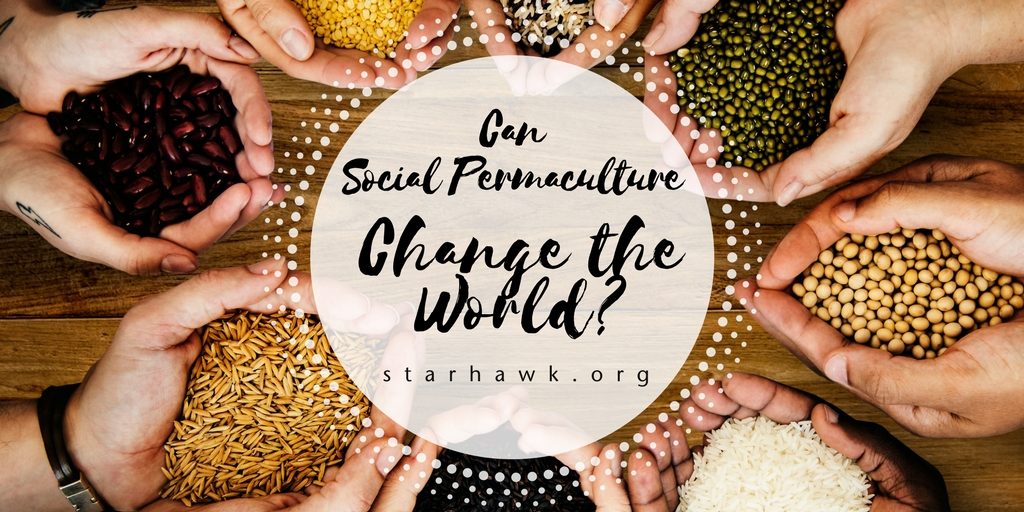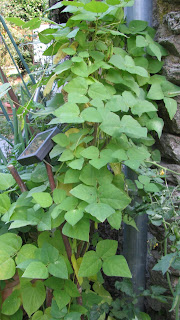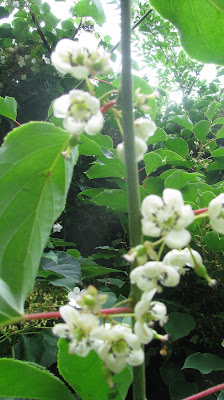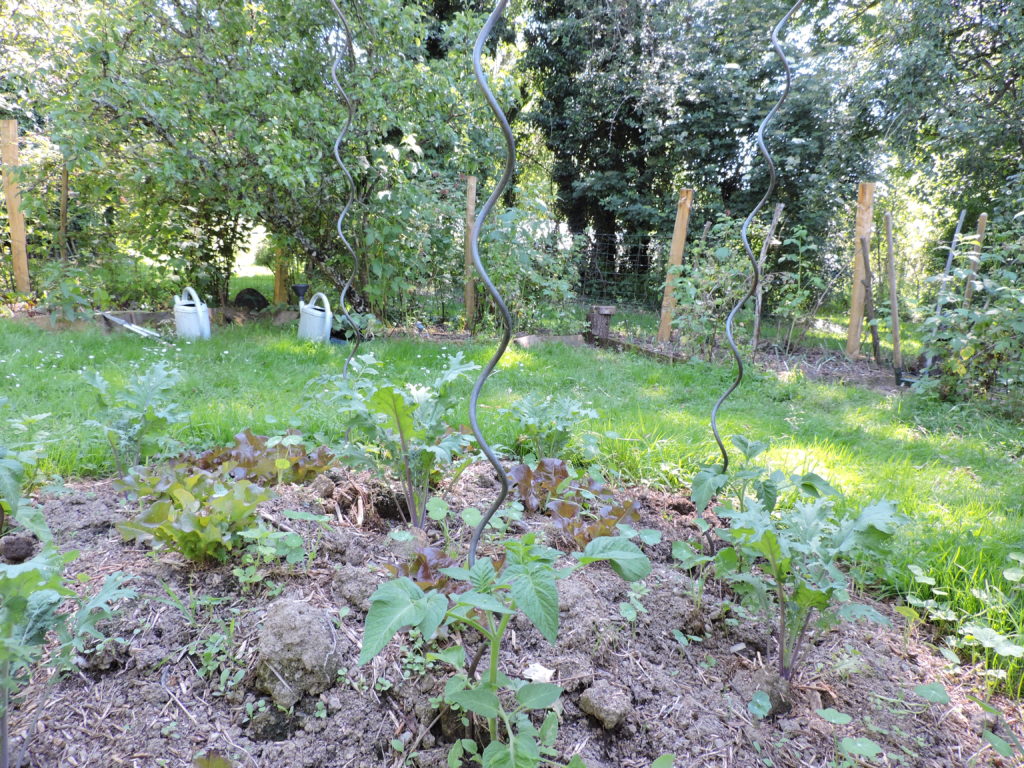vendredi 30 novembre 2018
mercredi 24 octobre 2018
social permaculture by Starhawk
Can Social Permaculture Change the World?

“Never doubt that a small
group of thoughtful, committed citizens can change the world; indeed,
it’s the only thing that ever has.”
-Margaret Mead
Small Groups Can Indeed Change the World—
—but to do so, they must work together effectively and nourish their relationships. Sadly,
there’s a pattern that repeats again and again: a group of people come
together excited to do work to change the world or create something that
inspires them all. In the beginning, all goes well…
…then conflicts arise.
Sometimes deep divisions and power struggles erupt. Other times, people just quietly fade away. A brilliant idea, an exciting project, a community in which people have invested emotionally and financially withers and dies.
For decades, I’ve worked in small
groups, from permaculture guilds to activist organizations to group
houses, and experienced plenty of conflicts and breakdowns, as well as
wonderful moments of joyful collaboration. I know the negative patterns can be changed.
If we identify the conditions that allow
groups to thrive and flourish, we can consciously design them into our
group structures. We can commit to learning and practicing better communication skills and using conflict resolution tools. We
can seed our groups in healthy soil, and create movements that are
truly inclusive and welcoming to all of us, in the full complexity of
who we are. And when we do, all of our important work becomes more effective.

What is Social Permaculture?
“Social Permaculture” is a term that has
become more prevalent in the permaculture world to describe all the
aspects of people-care and group dynamics that go beyond the garden and
the food forest.
But perhaps I should take a step back and
say that “permaculture” is a global movement based on an approach to
ecological design with an ethical framework, that takes nature as our
model. By understanding the
principles of how nature works, we can create systems—whether for food
growing, shelter, or social projects—that meet our human needs while
regenerating the environment around us.
Permaculture began with an approach to
agriculture that draws on much indigenous wisdom and traditional
practices, but puts them together with systems theory and agro-ecology. However,
as it has expanded into a worldwide movement of practitioners and
teachers, it has grown to encompass the idea of permanent culture.

Culture is inherently social—it encompasses all the ways we connect, communicate, co-create, and clash. The
dominant culture is toxic in so many ways, from underlying structures
of oppression such as patriarchy and white supremacy, to its focus on
competition and individualism over community.
But can we actually apply principles of
design to changing these structures, both in the social landscape and in
the ways we have internalized them? Do the patterns and principles we find in nature have guidance for us in creating social change and building new institutions? 

Social Permaculture as a Solution
These are the questions that social
permaculture asks, and to address them we draw from many fields, from
psychology to sociology to theories of group dynamics and organizational
structure. A social permaculture course
might range from exploring how we connect across the barriers of
diversity and historical oppression, to how we resolve conflicts in
groups, to how we can structure organizations to encourage creativity
and collaboration. It is useful for anyone who works in groups: permaculture
guilds, activist groups, spiritual groups, co-housing communities,
community organizers, friendship groups, even personal relationships.
Our social permaculture courses are interactive, focused on learning skills and tools and practicing them. We use exercises, games, and projects to bring out patterns of communication, and provide support for self-reflection. We
address the larger cultural patterns of racism, sexism, heterosexism,
ableism, class divisions and more, in a spirit that asks us to redesign
patterns of relationships so that we can connect, share, and celebrate
more deeply.
And we ground our work in a deep, spiritual connection to nature and one another.
Of all the work and teaching I do, social permaculture is perhaps the most vital, because it offers tools to make all of our work more successful and joyful. In these times of chaos and crisis, we need effective groups that can make change. And we need places of support and nurturance that can feed us as we work for a world of justice and resilience.
dimanche 7 octobre 2018
Peachy keen!
After 2 years without, the perfume of ripe peaches fills the kitchen again, time for jam, juice, cordial and dried slices....plums too, Victoria and Mirabelles, plus other wild varieties I don't the name of!
Temperatures still in the high twenties, never previously experienced 30°C in September....a bit of rain last week, perhaps some in 10 days time? Echoes of 2003, though the drought started then in April, and this year there were plentiful deluges until end June. At least I can get on with various excavations with the mini-digger, until the soil turns to squishy mud again...
Temperatures still in the high twenties, never previously experienced 30°C in September....a bit of rain last week, perhaps some in 10 days time? Echoes of 2003, though the drought started then in April, and this year there were plentiful deluges until end June. At least I can get on with various excavations with the mini-digger, until the soil turns to squishy mud again...
mercredi 3 octobre 2018
Oddibles
'Ting buttons' Spilanthes
The leaves are an interesting peppery buzz to add to salads, and the flowers are a taste explosion to entertain visitors with!
Achocha, 'stuffing cucumber' Cyclanthera pedata Still growing on its vine, as yet untasted.
Two new salad leaves, Houttuynia cordata , & Vietnamise coriander, Polygonum odoratum, perfumed and peppery additions to salads.
Cucumelon. Melothria scabra
Bite sized cucmber crunchy salad crop, growing on a delicate vine....I thought I'd lost all to the slugs in the spring, but a few made it through.
Another climber, a type of peanut...not sure of its latin name, or whether it will manage to complete seed development in time before frosts?

Tomatillos in the the polytunnel....having tasted them last year,
wanted to produce more. Again, despite early planting, fruiting is
relatively late, definitely needing frost protection.
vendredi 28 septembre 2018
lundi 16 juillet 2018
Yoga et Transe-danse
STAGE YOGA ET TRANSE-DANSE
OUVERTURE DE NOTRE
ESPACE INTÉRIEUR
À TRAVERS DES DIFFÉRENTES
EXPÉRIENCES LE LONG D’UNE JOURNÉE
Ce stage est accessible à tous
DIMANCHE 19 AOUT
2018 De 9h à 17h

Yoga Viniyoga
Transe-danse
Lorsque la posture est pratiquée sur Rituel d’expansion de conscience
une respiration, à l’action physique pour activer nos forces
d’autoguérison
s’ajoute une autre action au niveau → Détente émotionnelle
de l’attention. C’est le début de → Libération d’esprit
l’action qui intériorise. →
Ouverture à l’intuition
Matinée : de 9h à 12h30 avec Wutao (conscience de la
pulsation de vie), Yoga et Transe-danse
Journée animée par Sabine Flury-
Langer, Isabel Beaufils et Maria Sperring
Sabine : Naturopathe, animera la Transe-danse
Isabel :
Professeure de Yoga Viniyoga animera le Wutao, Yoga, Pranayama et Yoga Nidra.
Maria : Nous accueille dans son jardin « le blé en herbe ».
Elle nous propose un repas végétarien à midi (option vegan et sans gluten)
dans un environnement de respect de la vie et de la terre qui nous nourrit.
|
INFOS PRATIQUES :
Lieu : Le Blé en Herbe, Maria Sperring 23350 La
Cellette http://bleenherbes.free.fr
Tarif : 60€ la journée, possibilité de participer que
la matinée ou l’après-midi.
Amener des vêtements
souples, une couverture et un tapis. Pour la Transe-danse un foulard, bandeau
ou masque de sommeil.
Le tarif ne doit pas
être un obstacle si vous voulez participer.
Inscriptions :
Sabine au 06 75 05 25 98
Isabel au 06 71 36 77 93
Article La Montagne
Le Secours populaire de Creuse vient d’inaugurer son premier jardin créé par les bénévoles
Publié le 03/07/2018

Bien caché derrière le local du Secours populaire, le jardin
solidaire est un mélange de culture, aussi bien pour les variétés
présentes que pour les personnes qui s’en occupent.
C'est un petit lopin de terre qui commence à
prendre racine du côté du Secours populaire de la Creuse. Depuis cette
année, les bénévoles ont en effet relevé les manches afin de faire
sortir de terre un jardin solidaire. « Le projet est parti de Marthe,
une bénévole du Secours populaire, qui fait partie du réseau de
permaculture », précise Lucile Periot, secrétaire générale de
l'association. Après avoir lancé l'idée du jardin au printemps dernier,
les membres du réseau de permaculture de la Creuse ont commencé les
premiers travaux.Une centaine de variétés plantées Maria Sperring, membre du réseau, a soutenu l'opération et a apporté son savoir-faire dans la permaculture. « Nous avons effectué notre première journée de travail dès le mois de novembre. Nous avons commencé par nettoyer les espaces, créer des séparations entre les allées et les massifs. Nous avons également disposé des plants dans la terre mais sans structurer le jardin », explique Maria Sperring. Puis, avec l'aide des bénévoles du Secours populaire, les membres du réseau de permaculture ont commencé à donner forme à ce petit carré de verdure. « La première chose a été de faire un plan, et de parler avec Lucile par rapport à ce dont le Secours populaire a besoin », explique la jardinière. « Puis nous avons créé des bacs en fonction de l'orientation du soleil, des enjeux et des limites de culture. Il a fallu gratter le sol, avec du compost fourni Evolis et le BRF (bois raméal fragmenté), fourni par les espaces verts de la ville de Guéret. »
En tout, ce sont pas loin de 70 plantes qui poussent dans les jardins du Secours populaire. « Il y a une centaine d'espèces si on compte les plantes sauvages », précise Maria Sperring. Et tout est comestible ou médicinal, y compris les fleurs. Ainsi, se côtoient dans le potager cerfeuil musqué, baie de mai ou encore groseille à maquereau. Et ce jardin solidaire a le mérite de porter son nom, puisque les bénévoles n'ont disposé d'aucun budget pour élaborer ce projet. « La seule chose que j'ai payée, ce sont les pointes. Le bois nous a été fourni par l'entreprise Sostra'palettes, reconnaît Maria Sperring. Nous avons voulu montrer ce qui est possible avec un minimum de moyens. »
« L'idée de ce projet, c'est que les gens puissent se servir. Mais au-delà de la production, on a créé un espace de partage et de rencontres où les gens peuvent travailler en étant différents sur un projet commun. Bien sûr, nous ne pourrons pas fournir en fruits et légumes toutes les familles qui viendront. Mais cela permet de pratiquer la solidarité. Que les gens du Secours populaire soient aidés mais peuvent aussi être acteurs et aider l'association de quelque façon que ce soit », tient à affirmer Lucile Periot. Tout le monde peut venir travailler sur le jardin, puisque sa vocation est de mobiliser les gens sans prendre en compte les différences de chacun.
Une perspective d'agrandissement Le jardin solidaire est également orné d'un mobilier fabriqué entièrement à l'association. Nicolas Le Tron, artiste plasticien, avait en effet animé un atelier l'année dernière avec des jeunes migrants où les meubles ont été réalisés. Les membres de l'association du Secours populaire, ainsi que les membres du réseau de permaculture, espèrent, dans un avenir proche, investir les terrains qui entourent le local, afin d'agrandir leur potager. « Il y a un enthousiasme autour de ce projet, souligne Maria Sperring. C'est un projet de valeurs communes. C'est un jardin nourri avec l'âme, l'esprit et le cœur. Et c'est ce qui est le plus important. De nourrir autant le cœur et l'âme que le ventre. »
Pauline Rapinat
mardi 10 juillet 2018
|
|||||||||||||||
|
dimanche 17 juin 2018
Kiwaii looking very promising again,
covered in flowers, and lots of fruits in formation.
Been much more productive than the kiwis in recent years, even recovering from the late frost last year to give a decent harvest.
Takes up less space than kiwi, no unpleasant smells,, and enjoys growing up a north facing wall. Exquisite eaten fresh, ripe in October, not easily commercialised as the fruits don't keep long after harvest.

covered in flowers, and lots of fruits in formation.
Been much more productive than the kiwis in recent years, even recovering from the late frost last year to give a decent harvest.
Takes up less space than kiwi, no unpleasant smells,, and enjoys growing up a north facing wall. Exquisite eaten fresh, ripe in October, not easily commercialised as the fruits don't keep long after harvest.

bold wisdom!
“Nature!
We are surrounded and embraced by her; powerless to separate ourselves from her, and powerless to penetrate beyond her …
We live in her midst and know her not.
She is incessantly speaking to us, but betrays not her secret. …
She has always thought and always thinks; though not as man, but as Nature. …
She loves herself, and her innumerable eyes and affections are fixed upon herself.
She has divided herself that she may be her own delight.
She causes an endless succession of new capacities for enjoyment to spring up, that her insatiable sympathy may be assuaged. …
The spectacle of nature is always new, for she is always renewing the spectators.
Life is her most exquisite invention; and death is her expert contrivance to get plenty of life.”
— Johann Wolfgang von Goethe
dimanche 3 juin 2018
vendredi 1 juin 2018
jeudi 31 mai 2018
Atelier d'apiculture naturelle
ATELIER D'APICULTURE NATURELLE et la RUCHE KENYANE
Animation avec une approche différent de l'apiculture avec Le Coucou
https://www.facebook.com/Ruche-Kenyane-LE-Coucou-615505241…/
Présentation de différents modèles de ruches naturelles, suivi d'un atelier montage de ruche kenyane (tarif 85€, matériel fourni).
L’atelier sera confirmé à partir de commande de 4 ruches (maxi 10)
Réservation avec chèque à l'ordre: ‘Le Coucou’,
A envoyer à Maria Sperring, Puissetier 23350 La Cellette
L’évènement est ouvert à toute personne intéressée, sans commande de ruche, pour un prix libre …merci de s’inscrire pour aider notre organisation.
Prévoir un petit quelque chose pour un goûter partagé, boisson fournie.
Pour les renseignements et inscriptions: maria.sperring@wanadoo.fr ; https://wwwbleenherbes.free.fr
A bientôt au jardin !

mercredi 30 mai 2018
Beau-teas!
Magical Elder
The plant dryer is back in action, nettles, mint, and currently elderflowers and rose petals in anticipation of a new season of herb teas.
Cordials also infusing, and nettle and elder fizzes on the brew...when sunny breaks between repeated thunderstorms and heavy downpours allow the delicate blooms to dry enough for harvest.
Mayberries nearly finished now, strawberries and cherries starting to garnish breakfasts.
Why does anyone neglect to have edibles in a garden, when such treasures are easy to cultivate, and it's impossible to buy this kind of ripe freshness!
Some apple trees have nicely developing fruits, so fingers crossed for a reasonable harvest this year...promises of peaches too for the first time in 3 summers!
The plant dryer is back in action, nettles, mint, and currently elderflowers and rose petals in anticipation of a new season of herb teas.
Cordials also infusing, and nettle and elder fizzes on the brew...when sunny breaks between repeated thunderstorms and heavy downpours allow the delicate blooms to dry enough for harvest.
Mayberries nearly finished now, strawberries and cherries starting to garnish breakfasts.
Why does anyone neglect to have edibles in a garden, when such treasures are easy to cultivate, and it's impossible to buy this kind of ripe freshness!
Some apple trees have nicely developing fruits, so fingers crossed for a reasonable harvest this year...promises of peaches too for the first time in 3 summers!
mercredi 2 mai 2018
mardi 10 avril 2018
vendredi 6 avril 2018
jeudi 5 avril 2018
mardi 20 mars 2018
Delices sauvages!
Atelier de cuisine des plantes sauvages à Utopaille
Dimanche 22 avril, 10H à Utopaille (23800 La Celle Dunoise)
Dimanche 22 avril, 10H à Utopaille (23800 La Celle Dunoise)

Maria
et Bénédicte sont très intéressées par l'utilisation et la cuisine des
plantes sauvages. C’est pourquoi elles vous proposent de venir passer
une demi-journée à Utopaille le dimanche 22 avril pour les découvrir et
les cuisiner ensemble. Voici
le programme:
10h00 : accueil à Utopaille
10h30 : départ au jardin sauvage pour faire la cueillette. Maria vous guidera pour cueillir en toute sécurité et partager ses connaissances
12h : retour en cuisine pour préparer le repas à partir des cueillettes
13h30 : repas pris en commun
10h30 : départ au jardin sauvage pour faire la cueillette. Maria vous guidera pour cueillir en toute sécurité et partager ses connaissances
12h : retour en cuisine pour préparer le repas à partir des cueillettes
13h30 : repas pris en commun
Une participation libre vous sera
demandée pour couvrir les frais relatifs au repas et remercier Maria
pour le temps qu’elle nous aura consacré. Le groupe est limité à 10
personnes, par ordre d’inscription en utilisant le formulaire de contact du site utopaille.fr (Il
reste 4 places). Venez avec vos carnets pour prendre des notes, voire
dessiner les belles sauvages. Eventuellement ciseaux et gants pourront
être utiles...
Si besoin, vous pouvez contacter Bénédicte au 06 65 49 27 11.
 |
| Hommage Roger Phillips |
lundi 19 mars 2018
Gueret...ville en transition ecologique!!!!
En plus que présentation de perma et la création des jardins au Secours Populaire, cette evennement est prévu comme lancement de création du groupe 'Guéret, ville en transition'.
Venez nombreux.uses pour soutenir les étudiants du Ecotroc23 et un moment de rencontre sympa entre écolos!
Conférence sur la
permaculture à la Bibliothèque municipale de Guéret
> Jeudi 22 Mars à la Bibliothèque municipale de Guéret de 18h30 à 20h
> Jeudi 22 Mars à la Bibliothèque municipale de Guéret de 18h30 à 20h
> Bien souvent la permaculture est réduite à la simple sphère du jardinage alors qu'elle se propose de repenser complétement notre rapport au monde, à la nature et à notre manière de faire société.
> Venez découvrir ses origines, comprendre la richesse de ce concept et partager l'espoir qu'il insuffle face aux défis que l'humanité va rencontrer.
> Malgré le peu de temps disponible face à l'immensité du sujet les intervenants essaieront de vous partager leur vision de cette notion en vous donnant des exemples concrets d'application des principes permacoles dans votre quotidien.
> En présence de Jean-Etienne Perez, Maria Sperring
Inscription à :
Commentaires (Atom)



























